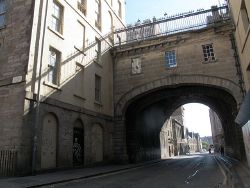South Bridge (Edinburgh)
| South Bridge | |||
| Location Map ( geo) | |||
 | |||
| |||
| From: | Royal Mile, Edinburgh | ||
| To: | Southside, Edinburgh | ||
| County | |||
| Midlothian | |||
| Highway Authority | |||
| Edinburgh | |||
| Opening Date | |||
| 1788 | |||
| On road(s) | |||
| A7 | |||
For other South Bridges, see South Bridge.
The South Bridge is part of the A7 in Edinburgh and crosses the Cowgate, a narrow street running east-west. Edinburgh is a hilly city, with roads on multiple levels. The Royal Mile runs on a ridge from Edinburgh castle eastwards to Holyrood palace, with steep slopes and valleys undulating on either side. The South Bridge connects the Royal Mile with raised land to the south, spanning the valley which contains the Cowgate and Grassmarket. To the north, the North Bridge fulfils a similar function, connecting the Royal Mile with the New Town. Together the two crossings are often known as The Bridges.
The bridge is 1000 ft long, and a maximum of 31 ft above the Cowgate. It comprises 19 arches, all but one of which are hidden by surrounding buildings: being heavily built up on both sides, it is easy to miss the fact that you are on a bridge at all. The topology can be fully appreciated by descending to the Cowgate on one of the nearby streets, and then rising up the other side: the climb is steep. At the north end of the bridge is the Tron, a former church now used as a tourist information point on the High Street; at the southern end is the Old College of Edinburgh University and Blackwell's bookshop.
History
An Act of Parliament in 1785 authorised a new bridge to improve connections between the High Street and the south of Edinburgh: beforehand you would have to travel down into the Cowgate and up the other side, which would be difficult for coach and horses or anyone with heavy goods. A section of the Old Town's buildings had to be destroyed to make space: Marlin's Wynd, Peebles Wynd and Niddry's Wynd were all demolished. The neo-classical architect Robert Adam produced plans, but they were considered too expensive, and the work was given to master mason and architect Alexander Laing (this appears to be Laing's only bridge although he worked on several houses and South Queensferry harbour).
The bridge was completed in 1788. Legend has it that the area's oldest inhabitant, an elderly lady, was chosen to be the first person to cross it. She died shortly beforehand, and instead her coffin was carried across, sparking a belief that the bridge was cursed. Underneath the bridge are a number of old vaults. They are sometimes claimed to be haunted, particularly by people running ghost tours and the owners of "Edinburgh's most haunted pub".
In December 2002, a fire in the Cowgate damaged many of the buildings next to the bridge and several adjoining properties had to be rebuilt.
